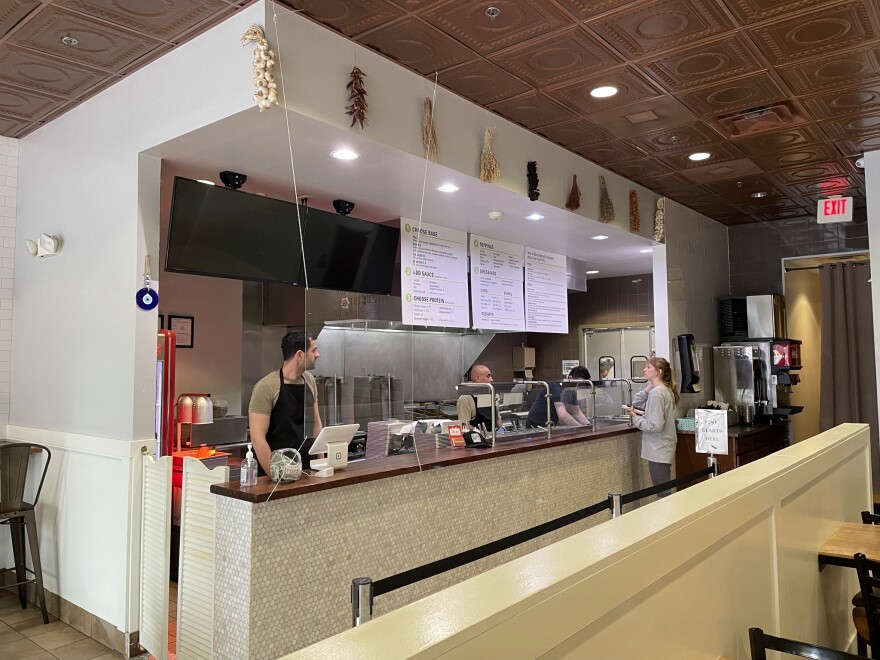The City of Columbus says, “Downtown is back,” with a parade of events, conventions and festivals scheduled for the summer. With billions of dollars in the pipeline for residential and commercial projects, one economist said the city is growing at a rate like never before.
Mayor Andrew Ginther used a press conference last week to sing downtown’s praises.
“A vibrant and lively downtown was put on pause during the worst of COVID-19," he said. "Now we are here pressing play again. Downtown is back. Back to work, back to fun, back to sports, back to life.”
Ilias Zervas, owner of Elia’s Athenian Grill, said that proclamation is valid.

“It’s actually true, we see a drastic increase in customers and in general, downtown feels more alive,” Zervas said. You see more people walking around, especially now that the weather is trying to get better. You see the parking lots are full.”
Many businesses rely on events or lunch crowds from employees at places like Nationwide Insurance. The end of most COVID-19 mandates has led to a resurgence in business, although some workers remain on a hybrid model.
Much of downtown’s comeback is tied to its rapid development. The landscape has changed drastically in recent decades. Bill LaFeyette from the economic strategy firm Regionomics said there’s more growth now compared to 20 years ago.
“Residential real estate has boomed,” he said. “It is continuing to boom. Office space probably won’t ever be needed to the extent that it was. So, you’re seeing all these conversions from office space to residential space.”
Buildings like the Kroger Bakery will be renovated to a mixed-use space with 364 new apartments, a parking garage, plus commercial and office retail space. That’s good for local restaurants since some big downtown employers like Nationwide and Huntington Bank remain at home part of the week. That hybrid model means even less real estate is needed by traditional downtown employers.
“If you have a workforce that’s into the office maybe half the time, you do not need a desk for everybody,” he said. “And if you don’t need a desk for everybody, you don’t need as much space as you used to.”
As that model continues to evolve, LaFeyette said restaurants and retailers may have to think about its post 5:00 p.m. business hours.
With workers coming back to the office, restaurants like the Elevator Brewery and Draught Haus have seen an uptick in business. It’s in proximity to Nationwide and many downtown hotels. Bartender, cook and supervisor Geoff Bommer said business has picked up during the week and over the weekends.
“Ya know, we’re definitely getting there,” Bommer said. “Lunches are way better than they used to be, since the people are working again. Since we’re close to the hotels our business has kind of been event-driven. When there were no concerts, no conventions, it was a little thin.”

COVID-19 mandates have ended and events are springing back, like free summer concerts from Sheryl Crow to the Beach Boys. The Columbus Crew and Columbus Clippers both play through the summer and theaters are packed with shows.
While business has improved, Bommer said there are supply chain issues.
Liquor has been tough to stock and items like chicken wings and calamari often have to be substituted. Those issues stem from the shutdown during 2020 and a rapid reopening of the economy that put strains on businesses.
Economist Bill LaFeyette said current projections show that those problems will continue but will work out over time.
“Just the idea of 6% growth in gross domestic product for several quarters over the last couple of years," he said. "That, under the best circumstances, would put strains on the economy, strains on the workforce, strains on the supply chain.”
As for the future of Downtown’s development, LaFeyette said there’s an opportunity to explore new businesses.
“It seems to me, that the extent of downtown retail space, restaurant space is affordable, then there’s the opportunity to bring in businesses that will meet the needs of this evolving clientele,” he said.
For more on what's happening downtown, see the 2022 Downtown Columbus Strategic Plan.




